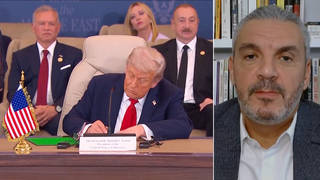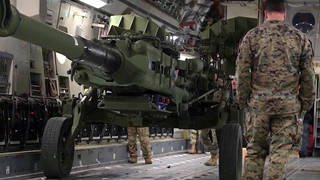
Topics
Guests
- William Hartungdirector of the Arms and Security Initiative at the New America Foundation. His latest book is Prophets of War: Lockheed Martin and the Making of the Military-Industrial Complex.
This week marks the 50th anniversary of President Dwight D. Eisenhower’s famous farewell speech to the nation, in which he warned against the rise of a “military-industrial complex.” We speak with William Hartung, director of the Arms and Security Initiative at the New America Foundation, who traces the rise of the military-industrial complex through the story of the nation’s largest weapons contractor, Lockheed Martin. Hartung’s new book is Prophets of War: Lockheed Martin and the Making of the Military-Industrial Complex.
AMY GOODMAN: Our guest is William Hartung. He’s the director of the Arms and Security Initiative at the New America Foundation, and he’s written a new book called Prophets of War: Lockheed Martin and the Making of the Military-Industrial Complex — very relevant as this is the 50th anniversary of President Dwight D. Eisenhower’s famous address talking about the military-industrial complex.
Talk about, Bill Hartung, the revolving door between Lockheed — and explain again why Lockheed is so important — and the government.
WILLIAM HARTUNG: Well, the Bush years were a bonanza for the Lockheed Martin Corporation. They had a guy who went to run military space for the Air Force. They had the deputy national security adviser. They had the guy running the nuclear weapons complex. They had the guy who helped run the Homeland Security Department’s procurement program. All coming from Lockheed Martin.
JUAN GONZALEZ: Oh, that’s what I was going to say. When you say they “had” them, they all came from Lockheed Martin.
WILLIAM HARTUNG: They came from the company, so they were on the inside able to help them, yeah.
JUAN GONZALEZ: And when you say that they’re perhaps the most corrupt of the military-industrial companies, what do you mean?
WILLIAM HARTUNG: Well, starting with the cost overruns in the ’60s, they had record cost overruns on their C-5 aircraft. Then they were involved in the bribery scandals of the ’70s, where they bribed, you know, prime ministers in Japan and Italy. They bribed people in Indonesia and Saudi Arabia. So basically they were at the cutting edge of many of these, you know, corruption scandals. They helped get government subsidies for their mergers in the ’90s, in a conflict-of-interest deal that involved William Perry.
JUAN GONZALEZ: Now, were they ever sanctioned for any of this?
WILLIAM HARTUNG: Well, the bribery scandals, a few of their executives had to step down. But no criminal charges were ever brought.
AMY GOODMAN: What was the C-5A scandal?
WILLIAM HARTUNG: Well, they were supposed an aircraft that could go anywhere, basically what they called a flying military base. And it was going to be, post-Vietnam, a way to intervene more quickly. But what happened was they ran a $2 billion cost overrun, and the thing didn’t work. The Air Force tried to cover it up. And Ernest Fitzgerald, the whistleblower, actually lost his job over exposing this. And only when William Proxmire went to his defense was he restored to his job in the Pentagon.
AMY GOODMAN: Now, why does the U.S. government pay for their scandal?
WILLIAM HARTUNG: Well, I mean, basically, there just wasn’t the backbone, you know, among the presidents of those eras to really say, “Look, you know, you’re the one who screwed up here; you should be paying the cost of it.” But, you know, because of Proxmire, they did claw back a few hundred million of that $2 billion, but basically the company got off scot-free in many respects.
AMY GOODMAN: There’s a lot of discussion now about President Reagan. His son Ron Reagan is saying in his new book that he was suffering from Alzheimer’s through — well, through the majority of his administrations. But you have a whole chapter on — well, you call it “Reagan to the Rescue.”
WILLIAM HARTUNG: Well, Reagan doubled Lockheed Martin’s contracts in the first three years he was in office. So they were a little bit behind the curve in the Carter years, when spending dropped. And so, this was the era of the $600 toilet seat, the $7,000 coffee maker, rigged Star Wars tests. All these were done by Lockheed Martin during the Reagan era. So, they got a huge boost in their contracts at the same time that they were bilking the government on all kinds of activities, as well as helping to rig the Star Wars program, which helped Reagan push it along at a time when people were saying, you know, “How is this thing ever going to work?”
JUAN GONZALEZ: And how — what kind of influence or largesse did they get from the Clinton administration, and now from the Obama administration?
WILLIAM HARTUNG: Well, Clinton years were good years for them, because that was the merger period. And they got a couple hundred million dollars to help them merge, to close down factories, even to pay executive bonuses for guys like Norm Augustine. We helped pay his golden parachute when he switched from Martin Marietta to Lockheed Martin. You know, so, basically —
AMY GOODMAN: How much?
WILLIAM HARTUNG: Well, he got $8 million, of which we paid $3 million directly and the rest indirectly, because that’s — we’re the only place they get money from, is the taxpayers.
JUAN GONZALEZ: And what about the Obama administration?
WILLIAM HARTUNG: Well, under Obama, you know, so far, so good. I mean, he hasn’t cut military spending. He did stop their F-22 combat aircraft, but he cut $4 billion from that and he added $4 billion to their F-35. So basically that was a wash, even though it was sort of portrayed as getting tough with Lockheed Martin.
AMY GOODMAN: What is Lockheed Martin’s role in interrogating prisoners at U.S. facilities from Iraq to Guantánamo?
WILLIAM HARTUNG: Well, they bought a couple companies involved in that: Sytex Corporation, Affiliated Computer Services. So they were recruiting interrogators and translators for both Guantánamo, Abu Ghraib, some of the other prison camps in Iraq. They now have said that they’re out of that business, but there’s no way to document that, because they still own those companies.
JUAN GONZALEZ: And do they have much in the way of international sales? I mean, there’s the big deal now with China, but in other parts of the world? Or is basically the United States, the government, their mainstay?
WILLIAM HARTUNG: Well, there’s a huge upsurge in weapons exports during the Obama years — up to $30 billion a year now, from about $10 billion at the beginning of the Bush years. And Lockheed Martin is right in the middle of that. They sell F-16 fighters. Their new F-35 is going to be built in 18 different countries, so a lot of the production will be done overseas, which is not normally the case in a fighter plane, but it’s been built in to the way this program has been designed.
AMY GOODMAN: So, the production is overseas, and it’s being sold overseas, but the U.S. subsidizes the corporation.
WILLIAM HARTUNG: Exactly. So there will be some jobs here, but many, many fewer than they would be advertising.
AMY GOODMAN: Why, under Obama, has the — have weapons exports so increased?
WILLIAM HARTUNG: Well, some of it is hangover from the Bush years. The deals were struck then, and they’re happening now. Part of it is exports are a huge part of his policy. So, we just concluded a $60 billion deal with Saudi Arabia, which is the biggest deal ever — mostly benefiting Boeing, but also Lockheed Martin as a secondary company. So, you know, I think he really feels that, you know, exports of any kind are a benefit, and so he’s — he hasn’t really had a plan on controlling arms exports.
JUAN GONZALEZ: Sixty billion with Saudi Arabia? What does that entail?
WILLIAM HARTUNG: Well, 80 or so fighter planes, hundreds of Apache attack helicopters, everything from ammunition to guns to bombs. It’s pretty much a, you know, across-the-board kind of arming of the Saudi both internal security and armed forces.
JUAN GONZALEZ: And of course the Saudis have this huge need for all of this stuff, given all the threats from other countries that they have, supposedly?
WILLIAM HARTUNG: Well, they have been using it to go into Yemen and to attack some forces there. But basically, it’s about money and jobs.
AMY GOODMAN: And Saudi Arabia is one of the biggest human rights abusers in the world. I mean, right now we see the revolution taking place in Tunisia, that the U.S. government shored up the dictator there — right? — Ben Ali. And now, yeah, the U.S. got an economy that they felt good about, and they called it a secure country. It is hardly secure, and the people are rising up. What about what’s happening in Saudi Arabia? You’re talking about it also being used for, quote, “internal security”?
WILLIAM HARTUNG: Yes, U.S. firms have been training the Saudi national guard for decades. So, if they ever had to go up against the Saudi people, quite possible U.S. contractors would be there on the side of the Saudi government.
AMY GOODMAN: Why is there so little written about Saudi Arabia? I mean, in these WikiLeaks documents on Iran, you know, there’s a great deal of attention to Israel pushing for war with Iran. But what came out in the WikiLeaks documents is countries like and particularly Saudi Arabia was actually pushing to attack Iran.
WILLIAM HARTUNG: Well, I think part of it is oil. I mean, I think a lot of the media doesn’t really go after them because they’re viewed as sort of untouchable, because the U.S. is not going to change its relationship with them, sort of regardless of what is reported. Part of it, I think, is ideology. You know, Iran — beating up on Iran is better business and better security strategy, if you want to keep large U.S. military budgets, than beating up on an ally. But there’s so much about Saudi Arabia that hasn’t been reporting, including their funding of fundamentalist groups that have ties to terrorism. It’s really one of the bigger outrages of our foreign policy.
AMY GOODMAN: Bill Hartung, just putting our military-industrial complex in a global context, the United States spends nearly as much on military power as every other country in the world combined. According to the Stockholm International Peace Research Institute, we spend six times more than the country with the next highest budget, which is China.
WILLIAM HARTUNG: That’s right. And despite that, of course, the Chinese threat is being waved at us as the reason to build new combat aircraft, new combat ships, even though for them to try to catch up with us would take probably half a century. And even then, it’s not clear it would happen, because it’s not like the United States would stand still. So this is really for power projection. It’s military bases all over the world. It’s the ability to intervene on whatever grounds — national security, humanitarian, however they want to dress it up. It’s really about being an imperial power, in many ways.
AMY GOODMAN: And yet, we just concluded — the U.S. government concluded a deal with China selling them how many planes from Boeing? I mean, we’re talking about weapons.
WILLIAM HARTUNG: Well, 200 airliners. But also, GE is giving them the electronics that can be used in any kind of aircraft — could be used in an airliner, could be used in a military aircraft. So, basically, they’re selling out U.S. technology for the short term and hoping it’s not used against the U.S. in the longer term.
AMY GOODMAN: What do you think, as an observer of politics for so long, and particularly focusing on the military and weapons spending — your book, Prophets — that’s P-R-O-P-H-E-T-S — of War, about Lockheed Martin — what do you think has to be done?
WILLIAM HARTUNG: Well, I think we need a president who will cut military spending by a good 20, 30 percent across the board, because then the companies will be in a harder position. You know, it’s one thing to lobby for one weapon system. But if you have to lobby against a 30 percent cut across the board, it’s sort of like putting them on the defensive. And I think, you know, that’s really the kind of thing that has to happen, because a reform here, a reform there, is not going to really undermine their power. But if you cut off their money source, it affects every other thing they’re able to do.
AMY GOODMAN: And yet, they would get fewer campaign contributions, wouldn’t they? Since you pointed out just this one company, Lockheed Martin, poured millions into each election cycle.
WILLIAM HARTUNG: Well, you know, they would probably try to spend more to head this off. But I think if they were starting from that level, it’d be very hard for them to get back to where they’d like to be, if there was really a serious, serious cut in the top line of the Pentagon budget.
JUAN GONZALEZ: And then, much of this government payments for these weapon systems then become, usually after every war, the basis for the new technologies. Basically, the government subsidizes the development of these new technologies that are then — these same companies — then used for other civilian purposes, right? That it becomes basically sort of a government subsidy for the companies to develop new technological systems to then market to the general population, whether it’s GPS or any of these other systems that we now take for granted, originally developed as a result of military research funded by the government.
WILLIAM HARTUNG: Well, it’s sort of a free ride for the companies, because they get the government contracts, and then they can spin off all kinds of other products. Now, it’s been harder lately, because commercial electronics, for example, is getting an advance of military electronics. So, the spin-offs are fewer, but the concept is the same. You know, we pay for the R&D, we pay for the weapon systems, we get them set up, and then they can go use that in the commercial markets.
AMY GOODMAN: And finally, the privatization of the military. Private military contractors in Afghanistan, they outnumber U.S. soldiers.
WILLIAM HARTUNG: Well, yes. It’s really become kind of war for profit. And it’s — you know, it’s not just logistic. It’s not just, you know, serving food and doing laundry. It’s not just fixing the weapons. It’s people carrying guns, and some of them near the front line. So, you know, it makes it that much harder — if you want to pull out troops, you know, are you really pulling out your full presence there? You know, how do you ride herd over that when it’s not just the Pentagon, it’s not just the armed forces, but it’s this whole concatenation of private companies that also need to be reined in?
AMY GOODMAN: And USA Today just revealed that because of new rules that say that officers, generals, people who advise the Pentagon, have to reveal other sources of income and who they’re working for, a number have quit, because they don’t want to reveal that.
WILLIAM HARTUNG: Well, I mean, it’s a huge business to leave the Pentagon and then go into the private sector. As Bryan Bender showed in the Boston Globe, 34 out of 39 generals and admirals immediately leaving the Pentagon went either to defense contractors or defense consulting firms. So some of them, in their retirement, can make more than they made in their entire military service. And so, this is another source of conflict of interest — and corruption. I mean, there’s been people who have gone to jail for the way they’ve helped private companies. When they’re on the inside, they give them a deal, and then on the outside, they go work for them.
AMY GOODMAN: Do you think we should still call them “defense” contractors?
WILLIAM HARTUNG: Well, they’re — you know, they’re weapons contractors. They’re — I don’t know what you’d call the broader — essentially, they’re sort of military-industrial-surveillance contractors. They do everything. But “defense” always has been kind of a — you know, I guess a euphemistic term for what they do.
AMY GOODMAN: The Pentagon was originally established as the War Department. We now call it the Defense Department. Do you think we should?
WILLIAM HARTUNG: No. I mean, you know, I think our government would have a hard time swallowing the honesty on that front, but I think it would go a long way towards people understanding what we’re about.
AMY GOODMAN: Bill Hartung, thanks so much for being with us. He works with the New America Foundation. His latest book is called Prophets of War: Lockheed Martin and the Making of the Military-Industrial Complex. Thanks so much for joining us.











Media Options